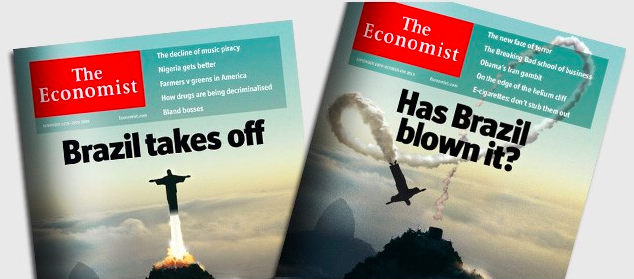Brazil: a role model for development ?
What can the rest of the developing world learn from Brazil's economic development and narrowing inequality gap ? Researchers explain the three elements of sustained growth
Armando Barrientos and Ed Armann
The Guardian, 17 april 2014
Brazil isn't getting the best press at the moment, with ongoing problems with the construction of the World Cup stadiums and protests about public services. Recently economic growth in the country has slowed, with some commentators arguing the recent government response sounds "the death knell for Brazil's economic strategy".
It's remarkable how far and fast Brazil has fallen from grace. Only a couple of years ago, the IMF and others were lauding the country for its resilience to the global financial crisis and its sound economic management.
We need to get this into perspective, because behind the hyperbole, there's much for other developing countries to learn from Brazil's recent experiences.
Countries such as Zambia, which has seen positive growth rates that haven't translated into poverty reduction, or Nigeria, which has seen inequality dramatically widen over the past 20 years.
In just 10 years, Brazil has been able to use consistent economic growth to lift around 40 million people out of poverty. And while the "thought-leaders" at Davos have been wringing their hands about the perils of inequality, over the past 10 years all regions and ethnic groups in Brazil have seen their incomes rise, with the poorest benefiting significantly more than the richest.
At the University of Manchester, we've recently embarked on a three-year research programme that will chart Brazil's development experience then look at which elements might work for particular African countries.
Even at this early stage, it's clear there are a few vital building blocks that have underpinned Brazil's progress:
Direct support to reduce poverty
Government investment in health, education and direct poverty reduction has played a major role – with the much-feted Bolsa Familia social assistance programme grabbing many of the headlines.
The scheme has proved to be hugely effective, providing financial support to over 50 million Brazilians. It has been responsible for 28% of the poverty reduction from 2002 to 2012. Bolsa Familia is also remarkably cost effective, amounting to just 0.5% of GDP.
But it's not the only social assistance programme in Brazil. The government's non-contributory pension schemes receive much less attention, even though they have twice the budget of Bolsa Familia and help to lift millions more out of poverty.
Investment in agriculture
The global rise in commodity prices certainly helped, but it's not the only reason behind Brazil's agricultural performance. The long-term growth in agricultural productivity has been catalysed by government policy and in particular, an investment in research through the activities of the Embrapa institute.
While large agribusinesses have benefited significantly, so too have smaller family farmers. Family enterprises account for 84% of Brazilian farms and 24% of farm land.
Unlike the subsistence agriculture practised by the majority of African smallholders, family farms in Brazil are well integrated into lucrative export markets. Government-sponsored research – and resulting technology – on crops, irrigation and maintenance has been crucial to this success.
Political consensus
Although individual policies have been important, it's Brazil's broader politics that have enabled a more profound development transformation.
Since the transition to democracy in the late 1980s, there has been a broad consensus across the political spectrum emphasising incremental and inclusive reform. This has led to relatively stable macroeconomic and fiscal policies.
The recognition of the country's "social debt" towards the poorest has also ensured an ongoing political commitment to tackle poverty and inequality.
However, as the protests last year demonstrated, many Brazilians are unhappy with the standard of public services and political leadership in the country.
Major problems with constructing the stadiums for the World Cup epitomise a broader malaise surrounding Brazil's approach to investment in infrastructure. Given the size of the country – and the economy – investment has been woeful for many years.
And while Brazil has a tax-to-GDP ratio of 36% (equivalent to many European countries), Brazilian tax payers finance generous pension benefits for civil servants, but much less generous benefits for the majority of the population.
Brazil is continuing to play a leading role in promoting south-south co-operation, particularly with Africa, where historical ties run deep and there are similarities in climate, geography and natural resources.
By providing a better understanding of Brazil's development process, we hope to highlight the positive policy choices African countries can make.
Professor Armando Barrientos and Dr Ed Amann are co-research directors of the International Research Initiative on Brazil and Africa at the University of Manchester.
fonte: The Guardian


Nenhum comentário:
Postar um comentário